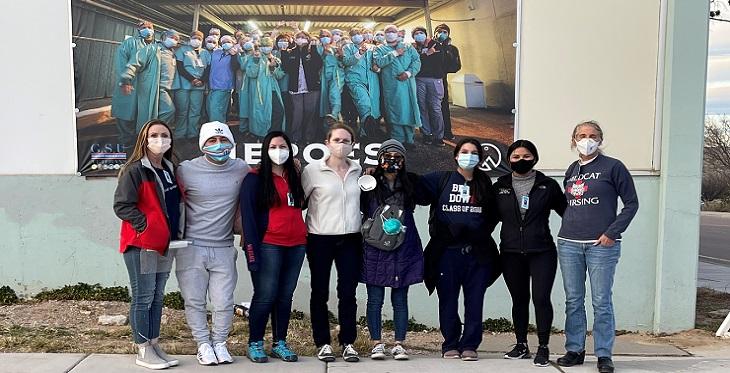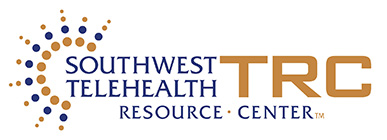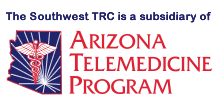
Left: Brook, Jimis, Lindsey, Stephanie, Anne, Sami, Dr. Godfrey, Dr. Kiser
Why am I ALWAYS crying? I swear right when I think to myself… “I got this, I GOT THIS”. Tears, puddles, Niagara Falls… pouring out. Every time I’m asked to share my experience. Why cry? Because of all the LOVE I have as a healthcare provider and the genuine connections I made during our crisis immersion in collaboration with the Gallup Indian Medical Center (GIMC), Gallup, NM.
After receiving the initial email from the University of Arizona College of Nursing asking for a group of nurse practitioner students to pioneer a trip to Gallup to assist the Indian Health Services with a mass vaccine clinic, I immediately signed up. I quickly read through all the details (very minimal information was provided) and sent in my application. The timeframe was short, very short, and we had to move quickly to ensure a "smooth" process and final credentialing.
Initial contact between the University and GIMC began in December 2021, and student recruitment was initiated on January 25th, with the final student selection on the first day of February. For one week from February 8th – 13th we would pause and answer a calling. All this during the middle of COVID, figuring out clinical placements for our program, and simply trying to manage the chaos involved with being a student in a Doctor of Nursing program.
Six students within my cohort, Brooke Harper, Anne Fong, Stephanie Hallenbeck, Lindsay DeWolfe, Sami Dalessio, and myself, were selected and accompanied by two of the most astounding professors in our program, Dr. Timian Godfrey and Dr. Lisa Kiser. Our goal was to assist in any way possible! We were there as guests. Nurses. We were doing what nurses do best, CARE. After getting onboarded and provided some hospital orientation, we quickly realized that we were in a patient demographic that, like many other underserved populations, was struggling from the residuals of COVID-19—understaffed, tragic deaths of family and community members, and most importantly, lack of trust.
GIMC was provided early access to the vaccines from the United States government to ensure the safety and adequate health of the native population. There was no need for implementing phases or meeting age qualifications. All native members were able to receive the vaccine; well, that's if it was available and qualified staff was there to administer it. Don't forget the trust aspect. How was this small outside group of nurses supposed to provide vaccine education and gain many community members' trust? Culture humility!
“Cultural humility, a process of reflection and lifelong inquiry, involves self-awareness of personal and cultural biases as well as awareness and sensitivity to significant cultural issues of others” (Yeager & Bauer-Wu, 2013). A concept far beyond cultural competency. Not only “knowing” and understanding specific cultural norms and rituals, but reflecting on those experiences and how it molds who you are and what your next actions are.
As a group, we began to dissect and unravel the elements of these phenomena. Every night at dinner, we debriefed, shared, and became more vulnerable by the new emotions that emerged throughout the day. An experience that will never be recreated should be disseminated to encourage students, faculty, community leaders, department heads, and all academia affiliates to promote MEANINGFUL immersions that achieve quality learning, lasting a lifetime.
Immersion Accomplishments:
- 2,100+ Moderna and 1,000+ Pfizer Vaccinations Administered to the Native Community
- Practiced strategies integrating cultural humility into clinical practice
- Provided culturally relevant education on a novel vaccine
- Practice integrating knowledge of socio-ethnogeographic pathology unique to the area, based on the presentation by hospital leadership.
- Demonstrated knowledge of community resources for plan and follow-up
This brings me to the final bit, these experiences and feelings don't just go away when you come back home. They promote new beginnings and spark significant relationships. Many students in our group confirmed their passion for caring for rural populations and plan to start their careers in rural communities after graduation. For myself, I developed a fantastic relationship with the Director/King/Head of it ALL, Dr. Kevin Gaines, and have been working with him to implement my doctorate project at GIMC.
Academia and healthcare leaders must be reminded why someone strives so hard to achieve a career in health; it’s because there was an experience, moment, event that pushed us to be motivated enough to disregard our own bias and provide true and powerful LOVE.
Reference:
Yeager, K. A., & Bauer-Wu, S. (2013). Cultural humility: essential foundation for clinical researchers. Applied nursing research : ANR, 26(4), 251–256. https://doi.org/10.1016/j.apnr.2013.06.008


